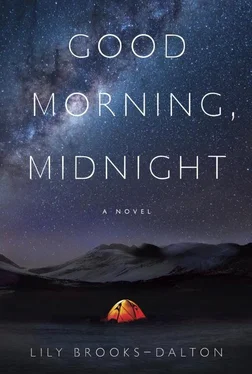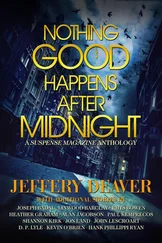Augie wanted to know if they would reenter the atmosphere, if they even could, and if they did—what they would find. What else was out there, beyond his frozen home? What did the rest of the planet look like? He wasn’t sure how to ask. They were still so far away. After so many months of just surviving, he was suddenly burning with curiosity to know—to know everything. There was an even longer pause this time, and he imagined what they might be saying to each other.
“KB1ZFI, this is Sullivan, I think we’re about to lose—” And they were gone.
“Standing by,” he said out loud to the emptiness.
AUGUSTINE HAD SEEN the last of the sun. It was officially autumn. The polar night began, and with it the temperatures grew extreme. It was time for hibernation again, for staying inside the main tent and keeping the oil stove burning hot. His short walks to the radio shed became more and more difficult; he felt his health failing, and breathing the subzero air hurt his lungs. The more he exerted himself the harder he breathed, and the harder he breathed the sicker he got.
Even so—he kept his vigil. He kept standing by, as often as he could. He fell in and out of dreams as he waited by the microphone in the little radio shed, dreams that grew more vivid as time passed, until he could no longer differentiate between sleep and consciousness. A fever kept him warm, heating his blood to a simmer within his veins. Eventually he heard the woman’s voice again and shook himself awake. He wasn’t sure how long it had been. Hours, or days.
“KB1ZFI,” she was saying, over and over. “KB1ZFI, KB1ZFI,” until finally he could rouse himself and find the microphone.
“Copy,” he said, “KB1ZFI responding.”
“I thought I’d lost you,” she said, relieved.
“Not yet,” he answered, his voice rusty, his throat full of phlegm. “Call me Augustine.” He released the Transmit button to cough a deep, chestbound rattle. He wondered how much longer he had.
“All right, then, Augustine. I’m Sully. It’s just me today. Tell me about the sky,” she said, “or the animals. Hell, tell me about the dirt.”
He smiled. It must have been a long time since she’d set her eyes on any of those things.
“Well,” he began, “the sky is dark all day here. I’m guessing it’s late October? No sun till spring, just stars.”
“It’s October all right. What about the animals? The weather?”
“It’s cold these days—maybe twenty, thirty below. And the birds, they’re mostly gone. The wolves, though, they’re still here, still howling, and Arctic hares, scampering around on the ice like that damn rabbit with the pocket watch, you know the one I mean. Oh, and there’s a bear. He shouldn’t be this far inland this time of year, but he is. Saw his prints in the snow myself. Between you and me, I think he’s been following me.”
“A polar bear? Following you? That doesn’t sound so good.”
“No, no, he’s all right—he’s easy company, keeps to himself. And the dirt—well, the dirt is frozen. Not much else to tell you here. Just hunkering down for the winter. And you?”
“Fair enough,” she said. “We’re in orbit now. Going to dock with the ISS if we can, see about rounding up the reentry modules.”
“And your trip? What did you see?”
“Jupiter,” she said. She sounded wistful. “Mars. The Jovian moons. Stars. Emptiness. I don’t know—it’s hard to describe it all. We were gone so long. Augustine? I think I’m going to lose the signal in a minute, we’re orbiting toward the Southern Hemisphere. But listen—take care of yourself, okay? I’m not sure what’s going to happen next. I hope we talk again. I hope—”
She was gone. Augie turned off the equipment and struggled back to the tent. He collapsed on his cot fully clothed. It was hours before the stove thawed him enough that he could move again, and when he did manage to remove his boots and his parka, a slippery thought crept into his consciousness and then fell away into his subconscious, in and out, in and out, until he fell asleep.

THE FEVER HAD its claws in him. He dreamed vividly of returning to the radio shed, of methodically turning on the generator, then the transceivers, but then he’d realize he was still on his cot, unable to move, and the dream would begin again in a loop: his mind would wake and go to the shed, and his body would remain. The rare moments of true wakefulness were painful and brief. He was hot and cold, shivering and sweating. For the most part he hovered on the edge of consciousness, dreaming about waking up, dreaming about dreaming about waking up. His brain was trapped in never-ending layers of his subconscious: each layer he pulled back led him to another and another.
Iris was there, in real life, or perhaps it was only in the dreams, he couldn’t tell. She was hovering over the cot with anxious eyes. She laid cool, damp rags on his forehead and steaming, hot rags on his chest. She sang to him; the wolves sang along with their faraway howls. At times he mistook her for Jean, at other times for his own mother.
When he eventually fought his way back to consciousness the tent was dark and cold, the electric lamp had burned out, and the oil stove had run dry. How long had it been? Where was Iris? He found a small reserve of strength, went outside and changed the oil drum, then rekindled the stove before he collapsed once more. He drank half a gallon of water, so cold it made his head ache.
He set the jug down and there was Iris, coming in the door, latching it behind her. Lifting the glass chimney from one of the kerosene lamps, then lighting the wick with a match and lowering the chimney back into place. Adjusting the flame. Carrying it to Augie’s bedside, holding the light over him for a moment and then setting it down on the table. Laying her palm against his forehead, sitting down on the edge of the cot and smiling. Her eyes said Go back to sleep, but her lips said nothing at all.
SULLY RUSHED BACK to Little Earth and started banging on all the sleeping compartments. She pounded on the frame of Devi’s bunk for a few beats before realizing it was empty, then hurried along the curve of Little Earth to the long table. Thebes was already there, eating dried fruit and looking at her quizzically; the others quickly emerged from their bunks. The overhead lights reached their full morning brightness as she relayed the story of the contact—their first contact since Mission Control went dark. Their expressions of sleepy annoyance gradually gave way to excitement. When she reached the end of her story, however, her crewmates looked more confused than enlightened.
“That’s it?” Tal asked. “He doesn’t know anything else?”
Sully shrugged. “I’m going to keep monitoring the frequency and I’m hopeful we can get him back, but yes, he doesn’t know much about what’s happened. He said it’s been radio silence since the other researchers evacuated a year ago.”
“Why did they evacuate?”
“I don’t know—war rumors. But that’s all he knew, rumors.”
“So then, this guy is what, like the last person on earth? Is that what we’re getting at here?” Tal seemed indignant.
“Don’t joke,” Ivanov admonished him.
Tal rolled his eyes. “I wish I were,” he said. “Think about it. If this guy has been trying to make contact for all this time and hasn’t been able to, not a peep till now…I mean, if something catastrophic happened, where would the safest places be—the least fallout? The poles, that’s where. Exactly where he is. It’s possible he’s the only one left.”
Читать дальше












